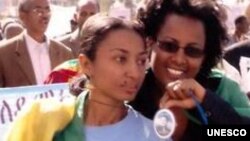Reeyot Alemu, an Ethiopian journalist who was unexpectedly released from prison last week after being convicted on terrorism charges, vows to continue her work as a reporter.
“I am sure I will continue my writings because it's my job, and also its my passion to write," she said. "And also I want to serve my country. I want to make Ethiopia a democratic country, it is my responsibility as a citizen and as a journalist also.”
Reeyot had spent four years and 17 days in prison after a conviction many believe was a result of her articles which criticized the Ethiopian government.
She believes that her writings may lead to future imprisonment, as she does not believe this government allows anyone to live safely in Ethiopia while opposing those in power.
In 2011, Reeyot was arrested and then sentenced to 14 years in prison, which was reduced to five years after appeal. Her release last week came one day after five other imprisoned journalists and bloggers were released unannounced.
During most of her imprisonment, Reeyot shared one room with four other prisoners. The most difficult part, she says, was not not being able to receive visitors while dealing with a breast tumor.
“They denied my rights to be visited by my friends, my legal advisors. Even with my sister, they allow her these two months," she lamented. "Before that for one year and eight months, even I did not see my sister. Only my parents, my mother and my father.”
Her father is also her lawyer, but during visitations they were not allowed to discuss legal matters.
While in prison, she says there were many offers for early release under the condition that she would agree to sign a letter admitting her wrongdoings or falsely accusing others. Reeyot refused and as a result, was ordered to spend another 11 months in prison.
These days Reeyot’s house is filled friends, family and other visitors welcoming her back. Next week she will go for a medical check up to continue treatment for her breast tumor.
Reeyot also plans on doing what she missed very much - reading books on political issues.
“I want to read how this country is, about the world," she explained. "Because these four years I did not know, I did not get many information.”
Many international organizations continuously pressured the Ethiopian government to release the imprisoned journalists. The country has been frequently criticized by human rights organizations for repressing dissident voices.
The Committee to Protect Journalists says Ethiopia is Africa’s second worst journalist jailer with 11 other journalists and bloggers still imprisoned.
On social media, some people commented that the decision to release the journalists is linked to the visit of U.S. President Barack Obama to Ethiopia later this month.
Newly Freed Ethiopian Journalist Vows to Continue Work

ADDIS ABABA —